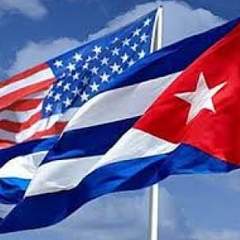Cuba USA
by Louis A Pérez Jr
source OnlineAthens
- When Us - Cuba Normalizing Relations Becomes Difficult
by Manuel E. Yepe A CubaNews translation. Quite a task is facing the US and Cuban leaders and officials who must try to reach agreements on the way to the normalization of relations between two neighbor countries that have so many differences. In the...
- In This Historic Day, We Are Proud Of Being Cuban
>< < "I have reiterated in many occasions our willingness to hold a respectful dialogue with the United States on the basis of sovereign equality, in order to deal reciprocally with a wide variety of topics without detriment to the...
- Cuba-us: Age Old Conflict Prior To The Revolution
by Angel Gueratranslation Cuba/Network in Defense of Humanity It is time to celebrate very justified the re establishment of diplomatic relations between Cuba and the United States and the re opening of their embassies historically on July 20. With the...
- Support For Cuban Struggle From Within Us
by Manuel E.Yepe Clearly, the heroic resistance of the Cuban people has been the decisive factor in the surprising breakthrough in efforts to move on towards a positive change in US policy regarding the island as expressed in the announcement of the US...
- Unasur Rejects Us Aggressions On Venezuela. Statement
Communiqué of the South American Union of Nations on the Executive Decree of the Government of the United States regarding Venezuela. The member states of the South American Union of Nations expressed their rejection of the Presidential Decree of the...
Cuba USA
U.S.-Cuba relations have always been far from 'normal'
by Louis A Pérez Jr
source OnlineAthens
- When Us - Cuba Normalizing Relations Becomes Difficult
by Manuel E. Yepe A CubaNews translation. Quite a task is facing the US and Cuban leaders and officials who must try to reach agreements on the way to the normalization of relations between two neighbor countries that have so many differences. In the...
- In This Historic Day, We Are Proud Of Being Cuban
>< < "I have reiterated in many occasions our willingness to hold a respectful dialogue with the United States on the basis of sovereign equality, in order to deal reciprocally with a wide variety of topics without detriment to the...
- Cuba-us: Age Old Conflict Prior To The Revolution
by Angel Gueratranslation Cuba/Network in Defense of Humanity It is time to celebrate very justified the re establishment of diplomatic relations between Cuba and the United States and the re opening of their embassies historically on July 20. With the...
- Support For Cuban Struggle From Within Us
by Manuel E.Yepe Clearly, the heroic resistance of the Cuban people has been the decisive factor in the surprising breakthrough in efforts to move on towards a positive change in US policy regarding the island as expressed in the announcement of the US...
- Unasur Rejects Us Aggressions On Venezuela. Statement
Communiqué of the South American Union of Nations on the Executive Decree of the Government of the United States regarding Venezuela. The member states of the South American Union of Nations expressed their rejection of the Presidential Decree of the...

